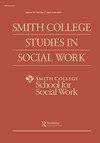精神分析、社会分析和社会工作:心理动力学对理解社会工作实践中的多样性、权力和制度的贡献
IF 0.9
Q2 SOCIAL WORK
引用次数: 1
摘要
理解和支持环境中的人(PIE)一直是社会工作实践的中心(Kondrat, 2013)。精神分析和精神动力学方法有助于我们在临床社会工作实践中理解心理内部和人际动力学,主要是在“人”和“环境”,母亲功能以及家庭和群体动力学领域。一些学者运用精神分析和心理动力学方法,将“环境”的范围扩展到社区、国家和国际层面的社会问题(如种族主义)和冲突(如仇恨犯罪和战后和解)(Hirvoner, 2017;Rasmussen & Salhani, 2010;Zevnik, 2017)。在本期特刊中,我们希望与这一学术成果保持一致,并将其范围进一步扩展到各级管理机构(如社会工作专业、媒体、学校、政府和法律),特别是心理动力学方法如何帮助社会工作者更好地理解多样性、权力以及机构在服务客户方面的工作。从精神分析和心理动力学的方法中激活社会工作的“社会”环境,我们从社会分析的奖学金中汲取。在一本名为《论社会分析》的书中,Bain(1999)通过借鉴Bion(1970)的“容器和包含”结构,提出了社会分析的定义,该结构最初用于探索精神分析中的现象,后来用于探索群体和制度现象。贝恩将社会分析称为“在社会分析咨询期间发生在组织容器和被包容之间的转变过程或共同进化”,可以用作“组织学习的衡量标准”(第3页)。他进一步提供了如何在四个意义上使用这种社会分析:(1)社会分析思想和理论(社会分析实践和思考社会分析思想的容器),(2)设计和方法(用于探索,例如咨询和行动研究,研究小团体行为),(3)机构(作为鼓励和开展社会分析工作的容器),以及(4)个人(作为社会分析工作的容器)本文章由计算机程序翻译,如有差异,请以英文原文为准。
Psychoanalysis, Socioanalysis, and Social Work: Psychodynamic Contributions to Understanding Diversity, Power, and Institutions in Social Work Practice
Understanding and supporting a person-in-environment (PIE) have been a center for social work practice (Kondrat, 2013). Psychoanalysis and psychodynamic approaches have contributed to our understanding of intrapsychic and interpersonal dynamics in clinical social work practice,mostly in the realms of “the person” and the “environment,” of maternal functions, and family and group dynamics. Several scholars apply psychoanalytic and psychodynamic approaches to expand the scope of “environment” into the social issues (e.g., racism) and conflicts (e.g., hate crime and after-war reconciliation) on community, national, and international levels (Hirvoner, 2017; Rasmussen & Salhani, 2010; Zevnik, 2017). In this special issue, we like to align with this scholarship and further expand its scope to various levels of governing institutions (e.g., social work profession, media, schools, governments and laws), especially how psychodynamic approaches help social workers better understand diversity, power, and the working of the institutions in serving clients. Invigorating the “social” environment in social work from psychoanalysis and psychodynamic approaches, we draw from scholarships in socio-analysis. In a book titled On Socio-Analysis, Bain (1999) offered the definition of socioanalysis by drawing from Bion’s (1970) construct of “container and contained” which was originally used to explore phenomena in psychoanalysis but later used to explore group and institutional phenomena. Bain refers to socio-analysis as “the transformation process, or co-evolution, that occurs between organizational container and contained during socio-analytic consultancy” which can be used as “a measure of organizational learning” (p. 3).He further offers how this socio-analysis can be used in four senses as: (1) socio-analytic ideas and theory (a container for the practice of socio-analysis, and thinking socio-analytic thoughts), (2) design and methodology (for an exploration, e.g., for consultancy and action research, for studying small group behavior), (3) the institution (as a container for encouraging, and carrying out socio-analytic work), and (4) the individual (as a container for the
求助全文
通过发布文献求助,成功后即可免费获取论文全文。
去求助
来源期刊

SMITH COLLEGE STUDIES IN SOCIAL WORK
SOCIAL WORK-
CiteScore
1.50
自引率
10.00%
发文量
10
期刊介绍:
Smith College Studies in Social Work focuses on the vital issues facing practitioners today, featuring only those articles that advance theoretical understanding of psychological and social functioning, present clinically relevant research findings, and promote excellence in clinical practice. This refereed journal addresses issues of mental health, therapeutic process, trauma and recovery, psychopathology, racial and cultural diversity, culturally responsive clinical practice, intersubjectivity, the influence of postmodern theory on clinical practice, community based practice, and clinical services for specific populations of psychologically and socially vulnerable clients.
 求助内容:
求助内容: 应助结果提醒方式:
应助结果提醒方式:


